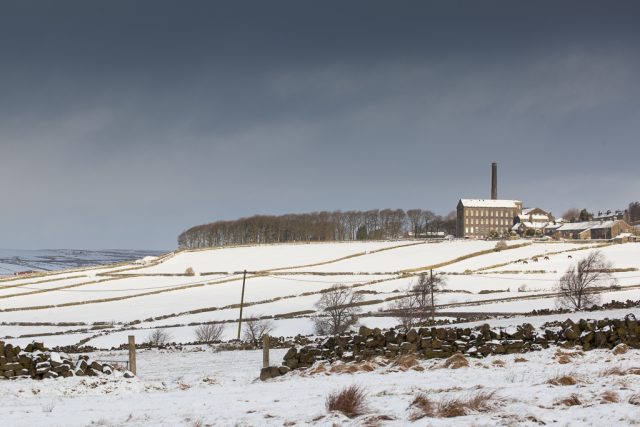
16TH FEBRUARY 2018
Hello.
Good grief, is it still February? As I say in On the Moor:
Christmas long-gone, and still winter drags on! By February, it’s getting beyond a joke. As my friend Mary used to say, there’s a reason why they only gave it twenty-eight days.
Still, we’re getting there. The snowdrops are out. The ash trees are beginning to bud. Dunnocks are starting to do unspeakable things beneath the shrubs. Spring is most definitely on its way.

Me and my big mouth!
Some stuff I thought worth sharing:
- One of my greatest music heroes, Mark E Smith of The Fall, has died. In an entirely selfless, humanistic attempt to educate the masses, I’ve been tweeting a weekly #FallFriday video link for the last few years. Everyone is unique, but M.E.S. was truly a one-off. Some tribute pieces:
- Guardian: Mark E Smith obituary: the Fall’s driving force was poet, satirist and misanthrope;
- Guardian: Legend of the Fall: Mark E Smith kept swinging to the end;
- AV Club: Remembering The Fall’s Mark E Smith, rock’s most uncompromising voice;
- NME: ‘My life with Mark E Smith’—former Fall member Brix Smith Start shares memories of her relationship with the ‘complex, brilliant poet’.
- Extracts from Alan Bennett’s 2017 Diary appeared on The London Review of Books website.
You can also listen to him reading the extracts. - How the index card cataloged the world
It turns out Carl Linnaeus, the father of biological taxonomy (Homo sapiens, and all that), also had a hand in inventing that most useful of categorisation tools: the humble index card. - Akenfield revisited: what a rural classic reveals about our changing countryside
Researchers have begun working on Akenfield Now, a project that will coincide with the 50th anniversary of Ronald Blythe’s classic book Akenfield. As with the book, the project will draw on oral histories recited by people who have grown up or lived in the area for much of their lives. - The origin of ‘us’: what we know so far about where we humans come from
A handy potted account of what we currently know about human evolutionary history. - …but, as always, our knowledge keeps growing. STOP PRESS: Oldest known human fossil outside Africa discovered in Israel
A fossil, dated to nearly 200,000 years ago, is almost twice as old as any previous Homo sapiens remains discovered outside Africa.
See also: Humans left Africa 40,000 years earlier than we thought - The Untreatable
An informative, scary piece about flu epidemics. - Great Exhibition of the North: an event to transform and delight
Newcastle and Gateshead will host the biggest event in England next year with an exhibition designed to challenge preconceptions of the North. #TheNWRA - The book that coloured Charles Darwin’s world
Like other naturalists of his time, Charles Darwin’s documentary tool was the written word. During the Beagle voyage, he drew many of his words from a slim volume entitled Werner’s Nomenclature of Colours, published in 1814 by the Scottish artist Patrick Syme. - Insects took off when they evolved wings
The evolution of wings not only allowed ancient insects to become the first creatures on Earth to take to the skies, but also propelled their rise to become one of nature’s great success stories, according to a new study. - Making it as an introvert
A typically thoughtful video by photographer Sean Tucker on the challenges of being an introverted freelancer. - Harvard University Library has digitised Virginia Wolf’s photograph album and made it available online.
Shameless plugs
To mark Charles Darwin’s 209th birthday, I wrote a piece about how the ghost of his friend John Tyndall (probably) helped solve the mystery of a morbid inscription I found in a book of Tyndall’s essays.
A couple of reviews of my book On the Moor: Science, History and Nature on a Country Walk…
Legendary science blogger, PZ ‘Pharyngula’ Myers describes it as:
…wonderful. Science and history and geography and evolution and culture all tangled up in musings while walking about the moors around Hebden Bridge.
while equally legendary science writer Brian Clegg writes:
There’s much to enjoy in Richard Carter’s pean to the frugal yet visceral delights of being one with England’s Pennine moorland. If this were all there were to the book it would have made a good nature read, but Carter cleverly weaves in science at every opportunity, whether it’s inspired by direct observations of birds and animals and plants […] or spinning off from a trig point onto the geometric methods of surveying through history all the way up to GPS.
What do you mean you haven’t got round to buying a copy of On the Moor yet? What happened to the New Year’s resolution? That yacht isn’t going to buy itself, you know!
See you in the Spring!
Love & hugs,
Richard
Leave a Reply